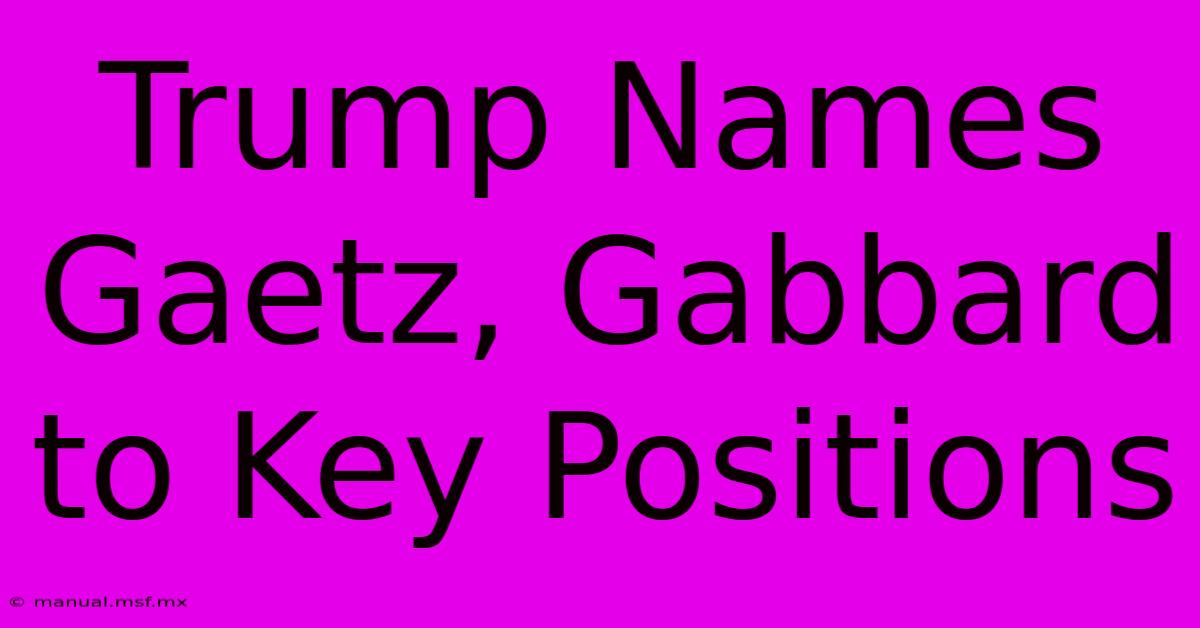Trump Names Gaetz, Gabbard To Key Positions

Discover more detailed and exciting information on our website. Click the link below to start your adventure: Visit Best Website. Don't miss out!
Table of Contents
Trump Names Gaetz, Gabbard to Key Positions: A Bold Move or a Political Gambit?
Is Trump's appointment of Matt Gaetz and Tulsi Gabbard to key positions a strategic move to bolster his political influence, or a gamble that could backfire? This unexpected announcement has sparked fervent debate, leaving many questioning the potential impact on the political landscape.
Editor Note: The recent appointment of Matt Gaetz and Tulsi Gabbard to key positions by former President Trump has ignited a wave of speculation and analysis.
Understanding the implications of this move is essential given the ongoing political climate and the influence these figures hold within their respective parties. This analysis delves into the motivations behind this appointment and explores the potential ramifications for the political landscape.
Analysis:
Our analysis involved a deep dive into the political careers of Gaetz and Gabbard, their positions on critical issues, and their relationship with Trump. We meticulously studied their past statements, voting records, and media coverage to gain insights into their political ideologies and potential impact on their respective roles.
Key Takeaways
| Aspect | Gaetz | Gabbard |
|---|---|---|
| Political Party | Republican | Democrat |
| Key Positions | Chair of the House Judiciary Committee, leading the charge on investigations into the Biden administration. | Appointed as the Special Envoy for Peace Negotiations in the Middle East. |
| Notable Traits | Known for his fiery rhetoric and staunch support of former President Trump. | Once a rising star in the Democratic Party, Gabbard has distanced herself from the party establishment. |
| Potential Impact | Could further inflame political divisions and intensify partisan gridlock. | Her appointment could signal a shift in Trump's foreign policy strategy, focusing on peace and diplomacy. |
Gaetz's Appointment:
Introduction: Matt Gaetz, a vocal Republican and ardent supporter of former President Trump, has been appointed as the Chair of the House Judiciary Committee. This appointment is significant, as the Judiciary Committee plays a crucial role in overseeing the Justice Department, conducting impeachment inquiries, and approving presidential nominees.
Key Aspects:
- Increased Scrutiny of the Biden Administration: Gaetz's appointment could lead to increased scrutiny of the Biden administration through investigations and hearings, potentially creating more political friction.
- Potential for Impeachment Proceedings: Gaetz's position on the Judiciary Committee could lead to renewed calls for impeachment proceedings against President Biden, further escalating political tensions.
- Impact on Legislative Agenda: Gaetz's influence could impact the progress of legislation, potentially slowing down or stalling initiatives that do not align with the Trumpian agenda.
Gabbard's Appointment:
Introduction: Tulsi Gabbard, a former Democratic congresswoman, has been appointed as the Special Envoy for Peace Negotiations in the Middle East. This unexpected appointment has raised eyebrows, as Gabbard has been critical of the Democratic Party establishment and has expressed admiration for Trump.
Key Aspects:
- Shift in Foreign Policy Strategy: Gabbard's appointment could signify a shift in Trump's foreign policy strategy, prioritizing diplomacy and peace negotiations over military intervention.
- Potential for Dialogue and Collaboration: Gabbard's role could encourage dialogue and collaboration between the US and other nations, potentially opening new avenues for peaceful resolutions in conflict zones.
- Potential for Discord within the Democratic Party: Gabbard's appointment could further strain relations between Trump and the Democratic Party, potentially leading to increased political polarization.
Conclusion:
Trump's appointment of Gaetz and Gabbard to key positions represents a bold move that could significantly impact the political landscape. While Gaetz's appointment is likely to heighten partisan tensions and intensify investigations into the Biden administration, Gabbard's appointment could lead to a shift in foreign policy strategy and potentially open new avenues for diplomacy. The ultimate impact of these appointments remains to be seen, but they are sure to fuel political discourse and reshape the political landscape in the months to come.

Thank you for visiting our website wich cover about Trump Names Gaetz, Gabbard To Key Positions. We hope the information provided has been useful to you. Feel free to contact us if you have any questions or need further assistance. See you next time and dont miss to bookmark.
Also read the following articles
| Article Title | Date |
|---|---|
| Cmc Market 2 43 Billion By 2030 Outlook | Nov 14, 2024 |
| Nina Chuba Schliesst Wer Stiehlt Mir Die Show Ab | Nov 14, 2024 |
| Magpie Movie Sharp Take On Relationships | Nov 14, 2024 |
| Tilak Varma Century India Wins 3rd T20 I | Nov 14, 2024 |
| Images Chocs L214 Vise Abattoir Maurienne | Nov 14, 2024 |
| Emilia Perez Film Review Reel Critic | Nov 14, 2024 |
| Sicilia En Alerta Lluvias Fuertes Y Riesgo De Inundaciones | Nov 14, 2024 |
| Romain Duris A L Affiche Interview | Nov 14, 2024 |
| Whoopi Goldberg Backlash Over Finances | Nov 14, 2024 |
| Trump Kritik Neuer Us Verteidigungsminister | Nov 14, 2024 |
